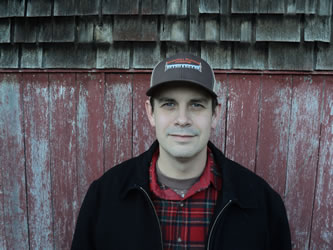|
I may have found the best place in the world to learn how to write fiction while paying rent on time and not going into student debt. It's Powell's Books in Portland, Oregon. They let the employees check out the books, and they have a lot of books—millions of books. I've worked there for thirteen years, mostly as a carpenter, writing in the mornings, and trying to keep up with the stack of checked-out books in the evenings. It took me a long time to discover the craft overlaps between carpentry and fiction writing, and most of those have appeared while standing beside my workbench, a sander humming underhand, and not while sitting at the writing desk, circling a silent mouse.
Time is the main thing.
There never seems to be enough of it, especially once you've gone and decided to become a writer, and also not sleep in your car. But at the same time, there is no way to rush craftsmanship, or the development of a craft. You must put time aside at the very moment you realize there isn't enough, that you have started too late, or from too far behind the start line, or both. You have to forget time because it's going to take how long it takes, not one minute longer, not one minute less. If you are making something in a way that you believe to be true, in a way that you can be proud of once finished, the joinery must be snug, there can be no mistakes uncorrected, no trading out quality for speed or quantity. The question is always, will it stand up to time and its use.
Will it break?
There are details about this thing you've made that only you can see, such as the way the figuring refracts light because of the great care you took in revealing the grain. Perhaps it appeals to your eye alone, but you must honor that vision, because only you can make the hundreds of decisions that are central to its construction. I've found you can only make those choices by having your own vision of how the thing should look when you're done. And when you've done it right, to your own satisfaction, well…there is nothing quite like that feeling.
The pride of the builder.
You know you've done it when you enter the woodshop and can't look away from the thing you've made. If there is a place for pride in this world, this is that place, the place of creation. Everywhere else, pride seems to lead to misfortune, or at least embarrassment, but during creation, it leads to craftsmanship. This is the reward. The payoff. The feeling of having made something that has pushed you beyond the edge of your craft, forced you to grow your skills to satisfy its creation. It's the process of getting better, and lucky for the craftsmen, the process is its own reward, because everyone starts at the bottom, sweeping the shop, just hoping to get a little better each day. It doesn't always happen, of course, and that feeling doesn't always come. You make mistakes. You fail. You rush the job, but then, sometimes you don't. It's the purest kind of magic I know of. And the places you travel, within yourself, to get there—if you know of those places, you know that time doesn't exist, there is no such thing as time, no time at all, so there is no reason to make something that isn't honest, that doesn't satisfy you. You are following glimmers of a blueprint that maybe only you have seen, and hope to someday share with others.
|


